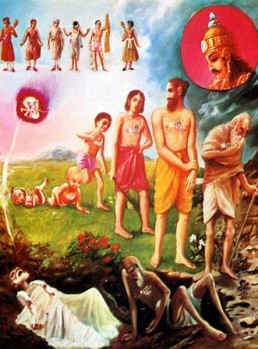Swami Chinmayananda
Swami Chinmayananda Commentary
According to the accepted theory of perception in Vedanta, an object is perceived not BY the sense-organs but THROUGH them. The Indriyas are instruments through which the perceiving-ego gathers the knowledge of the various objects. If the perceiver is not actually contacting the objects through the sense-organs, the objects, as such, cannot bring any perception to him.
That the same objects can give two different types of experiences to two different individuals is very well-known. The object remaining the same, if it can give different experiences, it is evident that it is because of the difference in the mental composition of the individuals. It is also observed that, objects of one’s intense fancy during a certain stage in one’s life, become a nuisance to the same individual after a time; for, as time passes on, the mental constitution of the individual also changes. In short, it is very clear that the external objects can convey their stimuli and give us an experience only when our minds come in contact with the objects through the sense-organs.
He who can understand that the objects of the world are in a state of flux, are constantly coming into existence and perishing — he will not allow himself to be tossed about by the existence or non-existence of the finite things of the world. In the flood of time, things and incidents, circumstances and environments flow up to our present from the unknown FUTURE, to give us vivid experiences of varied intensity, and they, in their very nature, cannot remain permanently, but must, of necessity, pass on to become one with the entire PAST. Nothing can remain the same, even for a short period, in the world-of-objects where change alone is the changeless law.
Having understood this finite nature of the changeable objects-of-the-world, wherein everyone of them has a beginning and an end, on no occasion need a wise man despair the least, of things THAT ARE, or of things THAT ARE NOT. Heat and cold, success or failure, pain or joy — none of them can be permanent.
Since every situation, of its own nature, must keep on changing, it would be foolish to get ourselves upset at every change noticed. It is wisdom to suffer them meekly with the comfort and consolation of the knowledge of their finite nature. It is the attitude of the wise to go through life, both in joy and sorrow, in success and failure, in pain and joy, with the constant awareness: “Even this will pass away.”
The external world of challenges is finite inasmuch as it has a beginning and an end. Not only that, Krishna adds, “they are impermanent by their very nature.” By the term ‘impermanent’ used here, the Lord means that the same object which gives pleasure at one moment starts yielding, at another moment, pain to the experiencer. This inconsistency is indicated by the term ‘anitya’ in the stanza.
WHAT GOOD WILL ACCRUE TO HIM WHO IS INDIFFERENT TO HEAT AND COLD AND THE LIKE? — LISTEN:
Adi Sankara Commentary
‘In the case of a man who knows that the Self is eternal, although there is no possibility of delusion concerning the destruction of the Self, still delusion, as of ordinary people, caused by the experience of cold, heat, happiness and sorrow is noticed in him. Delusion arises from being deprived of happiness, and sorrow arises from contact with pain etc.’ apprehending this kind of a talk from Arjuna, the Lord said, ‘But the contacts of the organs,’ etc. Matra-sparsah, the contacts of the organs with objects; are sita-usna-sukha-duhkha-dah, producers of cold, heat, happiness and sorrow. Matrah means those by which are marked off (measured up) sounds etc., i.e. the organs of hearing etc. The sparsah, contacts, of the organs with sound etc. are matra-sparsah. Or, sparsah means those which are contacted, i.e. objects, viz sound etc. Matra-sparsah, the organs and objects, are the producers of cold, heat, happiness and sorrow. Cold sometimes produces pleasure, and sometimes pain. Similarly the nature of heat, too, is unpredictable. On the other hand, happiness and sorrow have definite natures since they do not change. Hence they are mentioned separately from cold and heat. Since they, the organs, the contacts, etc., agamapayinah, have a beginning and an end, are by nature subject to origination and destruction; therefore, they are anityah, transient. Hence, titiksasva, bear; tan, them — cold, heart, etc., i.e. do not be happy or sorry with regard to them.
The Bhagavad Gita with the commentary of Sri Sankaracharya – Translated by Alladi Mahadeva Sastry
Holy Geeta – Commentary by Swami Chinmayananda
The Bhagavad Gita by Eknath Easwaran – Best selling translation of the Bhagavad Gita
The Bhagavad Gita – Translation and Commentary by Swami Sivananda
Bhagavad Gita – Translation and Commentary by Bhaktivedanta Swami Prabupadha
Srimad Bhagavad Gita Chapter 2 – Verse 14 – 2.14 matra-sparshas – All Bhagavad Gita (Geeta) Verses in Sanskrit, English, Transliteration, Word Meaning, Translation, Audio, Shankara Bhashya, Adi Sankaracharya Commentary and Links to Videos by Swami Chinmayananda and others – 2-14

